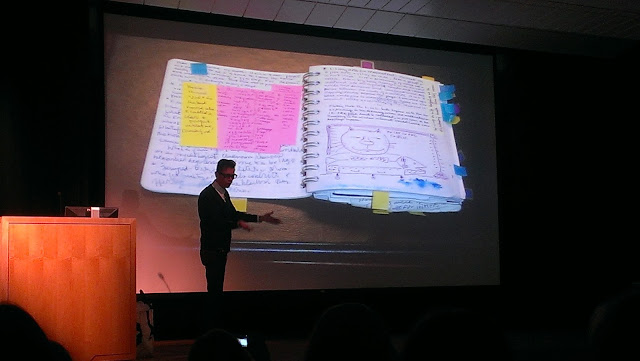Be still, my writing heart...
The most amazing part of the experience is that it renewed my faith as a writing teacher. I mean here are some truly successful people who've made writing and illustrating books their livelihood, and they're talking about stuff I teach to my second graders! Take the Writer's Notebook, for example. Jack Gantos, creator of the Rotten Ralph series--a childhood favorite of mine--shared his notebook with us.
He shared that he's been keeping journals and notebooks since the fifth grade. These journals became his prized possession and allowed him to record ideas for decades--ideas that he's turned into a multitude of published pieces, such as the Jack Henry series or his latest novel, Dead End in Norvelt. This is what we're trying to do in the second grade--engage our students in authentic experiences that shape their lives, just like Jack Gantos. Their writing notebooks are just like Jack's. They contain ideas, scribbles, notes, diagrams, lists, and colors that evolve into published pieces.
Jack Gantos also discussed the importance of story structure. He told us that many of his early works were rejected because he wrote complicated, messy plots. When he showed us his recipe for successful writing, my heart skipped a beat. Characters, setting, problem, solution...these are the elements we teach in second grade reading and writing, and here they are in a successful writer's toolbox!
That moment when you just know you're on the right track? Yep. For me, it was the DNA Lit Fest. I walked out of that library on a cloud.
Jack Gantos also discussed the importance of story structure. He told us that many of his early works were rejected because he wrote complicated, messy plots. When he showed us his recipe for successful writing, my heart skipped a beat. Characters, setting, problem, solution...these are the elements we teach in second grade reading and writing, and here they are in a successful writer's toolbox!
That moment when you just know you're on the right track? Yep. For me, it was the DNA Lit Fest. I walked out of that library on a cloud.



